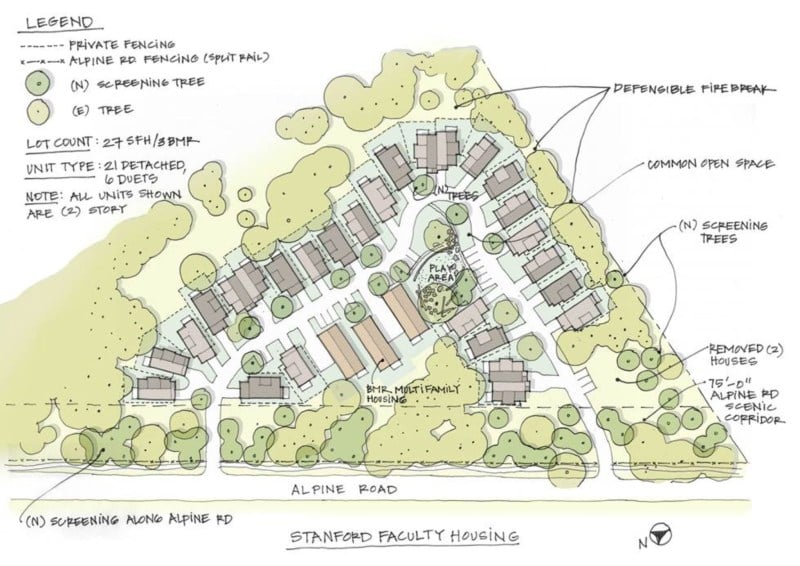Stanford’s announcement on Nov. 1 that it would withdraw its General Use Permit (GUP) application brought uncertainty about future and ongoing real estate projects. But despite the death of the GUP, the University is moving ahead with its plans to develop 27 faculty homes and three parcels for affordable housing units in Portola Valley on 75 acres off of Alpine Road.
Before Stanford withdrew its GUP application it had stated that it was willing to meet Santa Clara County’s demands to build faculty housing for all new faculty, which would have created 2,172 new units for faculty and staff. The Alpine Road project, which will develop six acres of modest homes on a 75-acre rural site, would have accompanied that larger development.
The town council for Portola Valley, a wealthy town in San Mateo County known for its rural character and high-acreage homes, had begun work with Stanford in 2016 to push forward plans to develop affordable housing in the area. Plans for the hilly property put all potential units into a six-acre dense core set back about 75 feet from Alpine Road.
Materials shown to the community depict the faculty homes as two-story three-or-four-bedroom dwellings with simple gable roofs. Also located on the community’s private road would be common spaces with play areas and picnic tables. It is unknown what price Stanford would set on the faculty homes.
Councilmember Maryann Derwin told the Mercury News that she believed that Portola Valley and Stanford had an obligation to address the Bay Area’s housing shortage.
“The only way we’re going to even make a dent in the housing crisis is for everyone to pitch in — private industries, public institutions,” Derwin said. “And every city in the Bay Area needs to pitch in. We should not be exempt because we historically have very large lots and a precedent for preserving open space.”
Stanford and the town have worked together to complete preliminary reports including a geotechnical assessment, biological survey and site utilities assessment.
But despite strong support from local government, some community members still have concerns as public hearings over the project begin. At public meetings over the past few months, several community members sought to kill the project over concerns about traffic and light pollution, according to the Mercury News. In response, Stanford eliminated two homes from the development and moved development away from the property’s borders.
Greg Corrales, an Alpine Road property owner, expressed opposition to development efforts to the Mercury News: “It just seems shady that this has been going on for two years and virtually none of the people who actually live here knew about it.”
Over the next year, Portola Valley will finish its environmental impact report and host a series of public hearings for community members to try and change or kill the development. As the developer Stanford is releasing a newsletter with relevant dates and updates.
Contact Cooper Veit at cveit ‘at’ stanford.edu
